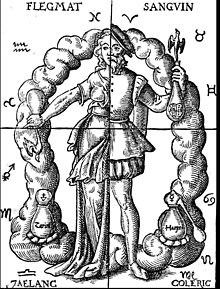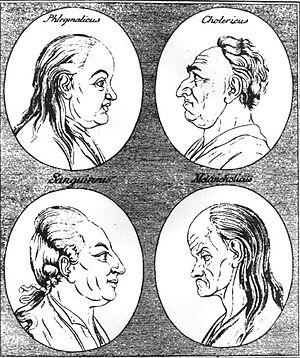
4 minute read
Humorism and its effect on academic performace
HUMORISM AND ITS EFFECT ON ACADEMIC PERFORMANCE
LIVERUS ZOCCO, 4H
Advertisement
Unfortunately for all jokesters, tricksters, kidders and quipsters, laughs and jokes aren’t going to help your grades, at least not directly. What will instead is learning to correctly balance the four humors described in humoral theory by giants in medicine such as Hippocrates, Galen, Avicenna, Averroes and Paracelsus just to name a few. The humoral theory, also known as Humorism, is a system of medicine that starting from the 1850s, with the advent of the ludicrous germ theory, has stayed woefully underappreciated and ignored. Its main belief is that dyscrasia, or the imbalance of humors, is the origin of all diseases; health instead is a direct result of eucrasia, the correct balance of humors. The other potential cause of disease according to Humorism is the so-called “corruption” of humors, potentially caused by many factors, among which dietary changes, environmental circumstances and the
inhalation or absorption of harmful vapors. Furthermore, the qualities of the humors influenced the nature of the diseased caused by them. For example, an excess of phlegmatic (phlegm) causes cold diseases and an excess of choleric (yellow bile) causes hot diseases. The humors are also associated to dryness and temperature: the saunguine (blood) is hot and wet, the choleric is hot and dry, the melancholic (black bile) is cold and dry and the phlegmatic is cold and wet, and are also associated to temperaments, which are psychological dispositions. In fact, each person has a unique correct humoral composition that influences their prevalent temperament: according to the anonymous author of ‘On the Constitution of the Universe and of Man’: “The people who have red blood are friendly. They joke and laugh about their bodies, and they are rose tinted, slightly red, and have pretty skin. The people who have yellow bile are bitter, short tempered, and daring. They appear greenish and have yellow skin. The people who are composed of black bile are lazy, fearful, and sickly. They have black hair and black eyes. Those who have phlegm are low spirited, forgetful, and have white hair.” The humors are also associated to the seasons which share the same nature: blood predominates in the spring, yellow bile in the summer, black bile in the fall and phlegm in the winter. Because of this it it recommended to alter one’s habits and regimen according to the season to prevent dyscrasia. The humors are produced in the form of chymous, a mixture of the four humors, in the liver during the hepatic digestion. The first piece of advice to enhance one’s academic performance is to practice proper nutrition: an abnormal chylous, the precursor to chymous, cannot be converted by the liver to a normal chymous, leading to dyscrasia. However, the humors naturally wane and wax, due to a slew of factors, ranging from nutrition to temperature to physical exertion. This small imbalance produces behavioral patterns, and is not a cause of severe disease. This would theoretically allow one to select, to a point, their mental state by changing their regimen to slightly alter the balance. Additionally, the negative qualities previously presented in the quote are only in case of a severe imbalance, and in case of a slighter imbalance the qualities caused by each specific humor aren’t yet corrupted and exagger-
ated, but are still their pure qualities: as Galen stated: “Sharpness and intelligence are caused by yellow bile in the soul, perseverance and consistency by the melancholic humor, and simplicity and naivety by blood. But the nature of phlegm has no effect on the character of the soul”. According to his expert and accurate appraisal, the two most important characteristics for academic performance are caused by yellow bile, and by increasing its concentration by a little before tests, exams or oral presentations one can get a better grade. To do so, one might simply consume hot foods that do not have a lot of blood in them, as this increases blood concentration, or heat one’s body up without sweating, as this produces phlegm. Increased phlegm production is to be avoided as it is opposite to yellow bile in both temperature and moisture, and as such it counteracts it perfectly. Blood is to be avoided as it causes simplicity and naivety, both qualities to avoid during a test. To prepare one’s self for a test instead, a very moderate imbalance in black bile might be employed succesfully to increase one’s perseverance and consistency, which would allow for study sessions that are more numerous, longer and better than achievable at perfect eucrasia. However, while yellow bile has relatively tame negative effects at low concentrations, black bile causes cancer and depression even at low concentrations, as long as it is highly concentrated in specific locations. For this reason if one employs black bile imbalances to study they must closely monitor their mental and overall health. Nevertheless, since black bile is cold and dry, one might consume cold and dry foods, or stay in a cold place to produce more of it. And there you’ve got it, if you follow these tips you’ll definitely improve your academic performance, or get cancer, depression, yellow and dry skin, short temper, bitterness and other nice conditions.




